
The role of the Board of Directors is an important one—arguably the most important in your entire company.
Your board is responsible for setting your company’s strategic direction, establishing governance principles, setting risk appetite, overseeing leadership and management, fulfilling fiduciary duties, and much more.
Your directors need to be curious, strategic, determined, and adaptable. But there’s one more thing they must be—ethical. It’s an important director trait that far too many overlook.
Why Boards Must Be Ethical
Just over 10% of employees worldwide feel they’re part of a strong ethical culture at work, while 65% have observed misconduct in the last year. That’s troubling.
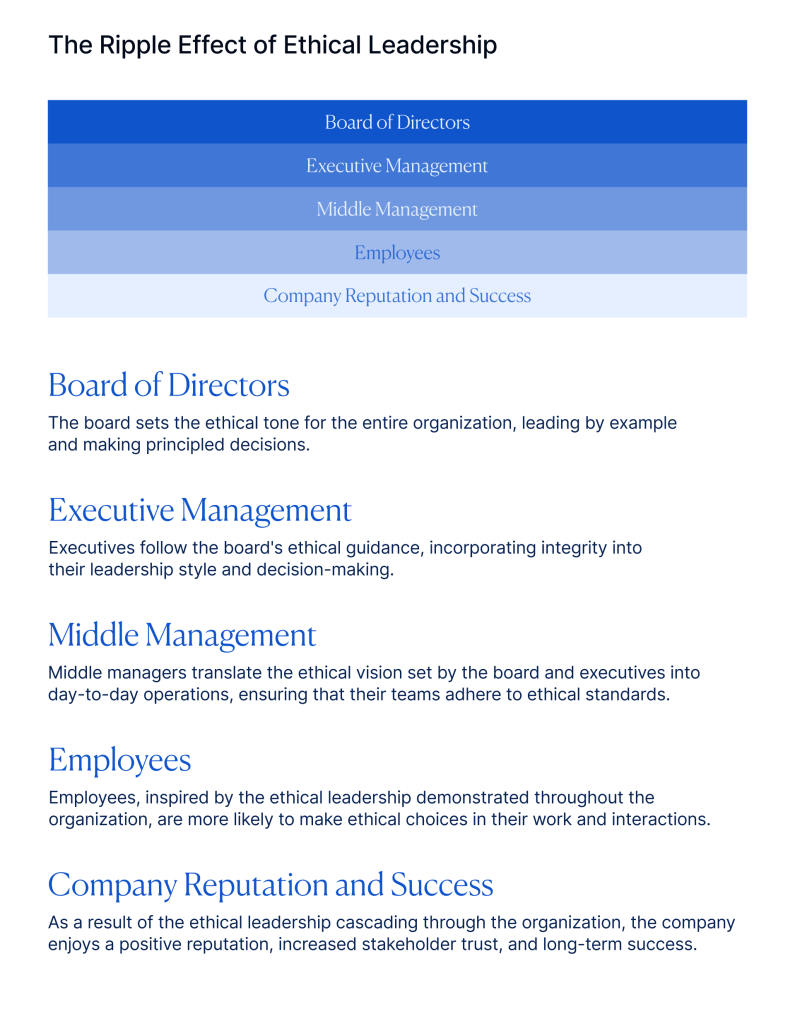
As Jeannette Lichner, Portfolio NED and former FCA NED, explains, “When I think of board members who I want to be involved with they are highly ethical. What do I see in them? People who I trust, who are open, candid in sharing what they know and don’t know. They are humble, inquisitive, and ready to ask even the simplest questions to confirm their understanding. They don’t hesitate to pause proceedings to revisit the fundamentals if necessary.”
Legal Ramifications
If you want a company culture built on honesty, integrity, and transparency—you need directors who are honest, ethical, and transparent. After all, your board of directors will set the tone for your entire company’s culture.
If your directors are self-centered, dismissive, and unapproachable—that’s the culture you’ll cultivate in your company. And cultivating a culture such as this can have serious repercussions.
For example, in 2001, the board of directors at Enron was implicated in unethical accounting practices that hid the company’s financial losses. The scandal led to the bankruptcy of Enron, criminal charges against company officers, and sweeping changes in securities laws through the Sarbanes-Oxley Act.
But Enron isn’t the only company to have fallen into the trap of not taking board ethics seriously enough. Tyco International made almost the same mistake in 2002, just a year later. The board of directors at Tyco International was criticized for its failure to detect and prevent the CEO and CFO from stealing hundreds of millions of dollars from the company. Ethical lapses also led to prison sentences for those involved.
As you can tell from the examples above, boards responsible for ethical lapses can face not just corporate consequences but also personal liability in some jurisdictions. But the legal ramifications for lapses in ethics, like those faced by Enron and Tyco, aren’t the only reasons your board needs to be ethical.
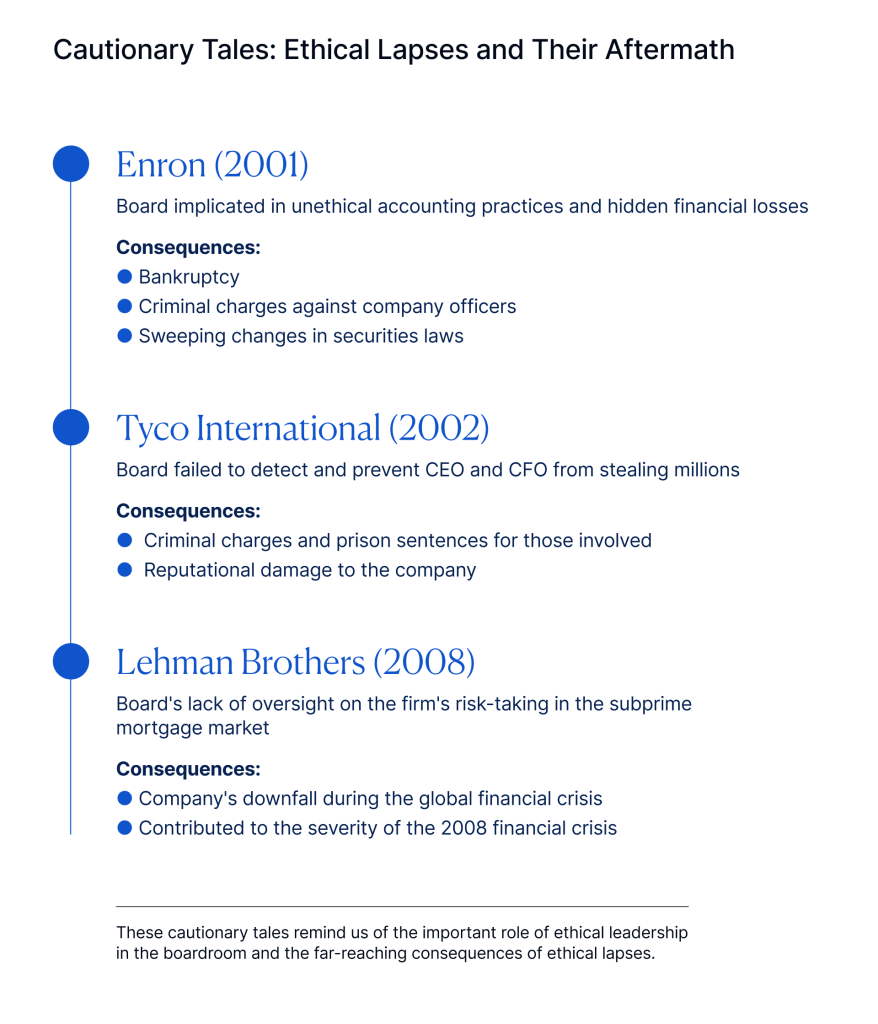
Reputational Ramifications
Your board also needs to be ethical because being ethical protects your company’s reputation, which is paramount. Not only do customers, clients, and consumers shun companies with bad reputations, but top talent does too. In fact, companies suffering from a negative reputation have to offer a premium—up to 10% more in compensation per vacant position—to attract the same level of talent that their competitors do without the increase.
And it’s not just a talent issue—because let’s face it, an unethical board might not even care about that—it’s a market value issue as well. In fact, 63% of a company’s market value is tied to its reputation. This means that the perception of your board as either ethical or not can influence your market value by an astounding 63%. That’s significant.

As Jeannette Lichner points out, ethical board members “are always prepared—they go beyond just reading the board papers. Most importantly, they consider decisions in the context of the organizational purpose and the impact on all stakeholders, and they do what is right—not just what may be legally permissible or highly profitable, but what is right. They are fierce protectors of the organization’s reputation.”
Similarly, Professor Charlotte Valeur, Chief Executive of Global Governance Group, emphasizes, “An ethical board will act in the best interest of the company and all its stakeholders. They understand the responsibility of serving a company and do not make self-serving decisions. Right and wrong are very clear to an ethical board, and generally they will avoid operating in the gray areas.”
Where Board Ethics and ESG Intersect
Legal and regulatory compliance, along with reputational protection, aren’t the only benefits of having an ethical board.
There is the trickle-down effect of leadership style and how ethical board members foster ethical managers. Stakeholder trust is also increased through board ethics, and entering new markets becomes easier when your board is known for ethical conduct (not to mention the ease of governmental scrutiny).
An ethical board is invaluable for Environmental, Social, and Governance (ESG) initiatives and success too.
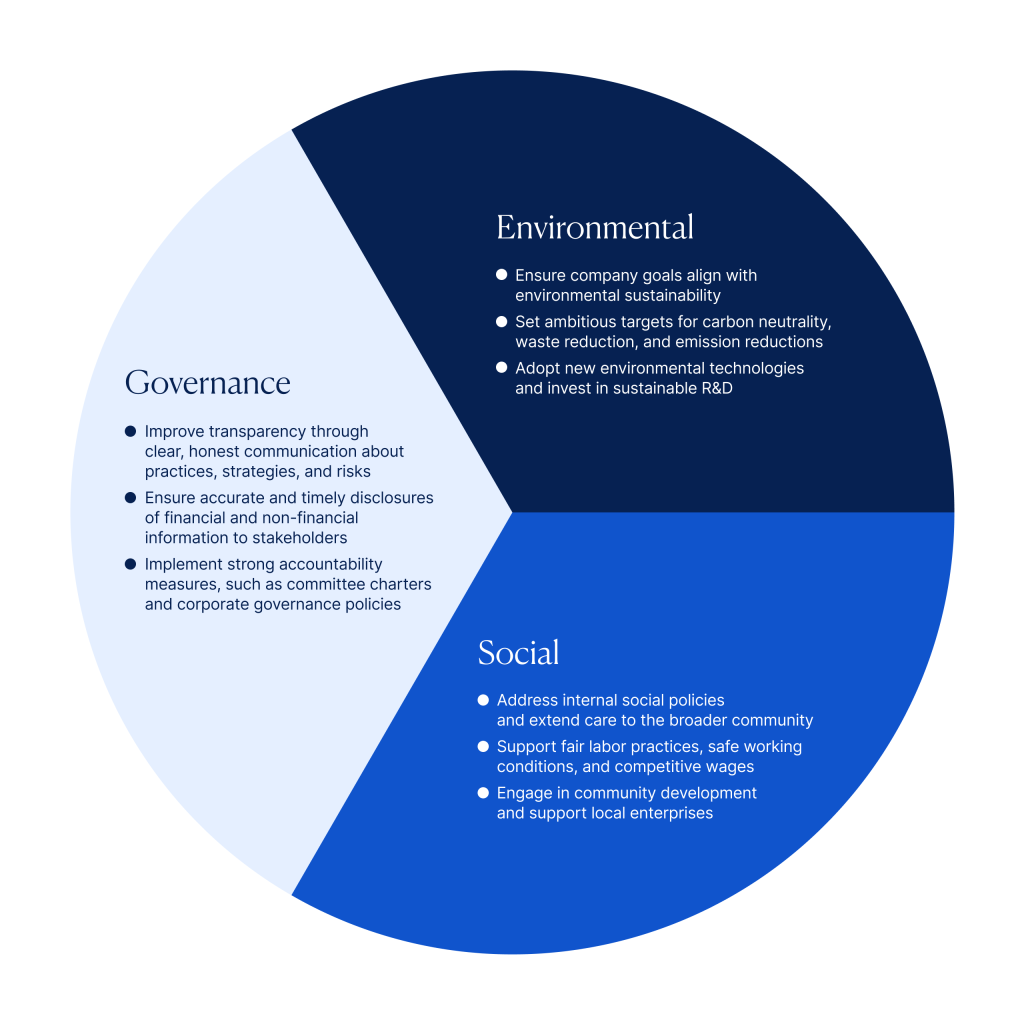
So, let’s quickly examine the effect that an ethical board has on ESG:
Environment
Ethical boards are green boards because being truly ethical involves considering the welfare of others. Plus, being green comes with a whole host of its own benefits. In 2023, 89% of industrial, energy, and natural resources companies rated ESG as important to them—and 46% said that their ESG initiatives had already improved their company’s reputation (and, again, your company’s reputation has a big impact on its market value).
Building on this notion, organizations are integrating the protection of the environment into their corporate strategies with ambitious goals. These goals often include achieving carbon neutrality by a certain year, committing to waste and emission reductions, creating wide-reaching sustainability programs, adopting new environmental technologies, or investing in research and development for sustainable business practices.
The main task for an ethical board in upholding the “environment” aspect of ESG lies in ensuring that the company’s goals are not just a list of targets, but that they infuse every aspect of the company’s purpose. This alignment is what will drive true sustainability, and an ethical board is the key to getting it right.
Social
The “social” part of ESG is just as important as the environmental one. Many companies have learned this the hard way, including big name brands like Nestlé. In the past, Nestlé has faced allegations regarding the use of child labor in its cocoa supply chains. A class-action lawsuit was filed against it and other chocolate producers in the United States by citizens from Mali, accusing these firms of complicity in the illegal enslavement of children.
Nestlé asserted (and continues to assert) its dedication to eradicating child labor and reports taking actionable steps to address these issues. In 2022 a lawsuit targeting companies including Hershey and Nestlé was dismissed by a Washington, D.C. federal judge. This case, despite its dismissal, demonstrates the importance of corporate boards seriously addressing the social component of ESG and the perceptions of their contributions in this area.
An ethical board should not only address internal social policies but also extend its care to the broader community. It should support fair labor practices, safe working conditions, competitive wages, and unionization where necessary. Beyond the company’s walls, ethical boards should engage in community development and support local enterprises.
Ethical boards should take consumer rights seriously, too. They should oversee marketing transparency, product safety, and the responsible handling of customer data. These efforts build trust and foster long-term relationships with stakeholders.
Governance
Boards that don’t take their role in governance seriously sink companies. This could be seen in the case of Lehman Brothers. In this case, the board’s lack of oversight of the firm’s risk-taking behaviors in the subprime mortgage market contributed to the company’s downfall during the global financial crisis in 2008.
Any board is at the top of any company’s governance pyramid—but an ethical board is also at the top of its company’s moral pyramid. It sets the moral tone for all leadership under it. You don’t want a board that sets the kind of tone that the board at Lehman Brothers set.
Ethical boards should improve their companies’ governance by being more transparent than is normal in corporate boards—they should provide clear and honest communication about the company’s practices, strategies, and risks and improve transparency with stakeholders by ensuring accurate and timely disclosures of financial and non-financial information.
They should also implement stronger accountability measures than is the norm—measures that involve developing structures for oversight and accountability, such as committee charters and corporate governance policies that define roles, responsibilities, and procedures for monitoring and enforcing ethical standards.
Jeannette Lichner offers her real-world view: “When someone asks me, ‘What are the traits or signs of an ethical board of directors?’ I think of several things. What is the culture or behaviors in and beyond the boardroom? How do board members interact with each other and with executives, both in and outside the boardroom? What are the bases on which decisions are made—is there enough exploration, or are decisions rushed through? Are difficult topics given sufficient agenda time? If not, what is the outcome—a decision made or postponed? How frequently does the board request more information? In discussions, does organizational purpose inform the evaluation and decision? What about the impact on stakeholders? How is profitability regarded—is it always the main focus? When evaluating decisions, does the board consider reputational risk? Do they focus on the legality or the rightness of actions?”
And because all boards impact and influence who leads the company—both on the board itself and in the C-suite and lower ranks—ethical boards should strive for board composition that recognizes the importance of diversity, not just in terms of background but in skill sets and experiences, and they should prioritize incorporating diverse viewpoints and expertise into the decision-making process to create more balanced and inclusive governance.
How Do You Know If Your Board is Ethical?
After reading everything above, you might be asking yourself, “Is my board of directors ethical?” If the answer is no, you must do something about it.
Fortunately, I’ve found that ethical boards all share a few common traits, such as:
1. Strong legal and ethical standards
I’m starting with this trait because it’s the most obvious but also the hardest to check for. If you ask your board, “Do you have strong legal and ethical standards?” every member will likely say yes—whether that’s true or not. That’s why it’s important to dig deeper.
Instead of just asking, look at your directors’ and your board’s past—are there any legal matters or judgments against directors or the company? If so, were they the result of unethical behavior? Consider whether there have been any allegations of misconduct at the top of the company. Also ask yourself, “Have board and committee minutes and meeting materials been analyzed to ensure that governance documents reflect a commitment to ethics and legal compliance?”
2. Compliance with codes of conduct
Checking whether legal and ethical standards are being upheld can be tricky, especially when you’re relying on the honesty and transparency of the people you’re evaluating. However, what is far less tricky is to verify adherence to your company’s own codes of conduct.
Start by ensuring a code of conduct is available to all employees and directors and that it contains information pertaining to expectations regarding ethical behavior. Then audit and monitor whether board directors demonstrate the appropriate business and ethical conduct as outlined in the company’s code.
3. Appropriate board composition
The ethical nature of your board largely comes down to what they do—but it also depends on who is on the board. That’s why, when working out whether a board is ethical, board composition is important.
Jeannette Lichner suggests, “I’d like to think most boards are ethical. In fact, who would say they are a member of a board that is not ethical. Ultimately, it comes down to the people, starting with the chair. Does the chair demonstrate high ethics, and talk about purpose and ethics? Then, consider the board members—how they are recruited as well as how they are as board members. Were they asked during their interview for the role to provide examples of when they’ve had to make tough, ethics-based decisions? It’s easy to claim, ‘Yes, I am ethical.’ Have they ever felt their ethics were compromised? These important questions should be part of the vetting process for potential board members.”
You should assess whether your board recruitment is integrity-focused and free of issues like nepotism, the “old boys’ club” mentality, or a lack of diversity and inclusion. The composition of a board is its foundation—if it is flawed or compromised, the integrity of the board may falter.
Your board should include seasoned professionals, leading minds, and technical experts, but most importantly, it should include individuals from diverse backgrounds, not just homogenous groups.
Also, evaluate past board member turnover—does your board experience a higher turnover rate than average? Does a certain demographic tend to have a shorter tenure than others? What were the reasons for previous board members’ departures? The answers to these questions will provide insights into whether your board of directors fosters a supportive and ethical environment conducive to success.

4. Comprehensive financial and operational oversight and risk management
While it’s imperative for your board to consist of ethical and diverse individuals who adhere to the law, regulations, and your codes of conduct, arguably the most important role of the board is to provide financial and operational oversight and risk management.
To evaluate if your board is performing these duties appropriately and ethically, consider the following questions: “Is the board setting short-term goals at the expense of long-term stability and growth?”, “How does the board stay informed and educated about the risks the company faces?”, and “Does the board’s risk assessment include an evaluation of ethical risks and the ethical implications of business decisions?”
The answers to these questions will help decide whether the board of directors is proactively ensuring that ethical considerations remain at the heart of financial, operational, and risk management discussions. If the answer to these questions is not satisfactory, there may be an issue in terms of how well your directors understand what is expected of them.
Jeannette Lichner observes, “One common issue is executives, non-executive directors, executive committees, and boards not fully understanding their roles. This can lead to numerous problems, such as inadequate board papers and executives hesitant to report bad news. I advise executive committees and boards to meet for a roles clarification—discussing, with real examples, what conduct is acceptable, what ethical expectations are in place, how individuals should interact, and reaffirming that everyone is part of the same team, albeit in different roles.”
5. Creation of an ethical company culture
Your board heavily influences the creation of your company’s culture—whether consciously or not. To find out whether your board of directors promotes ethical conduct, reflect on whether the culture they’ve fostered is a principled one.
Consider questions like: “How does the board prioritize corporate culture and its influence on ethical behavior within the organization?”, “What specific actions has the board undertaken to fix any deficiencies within the corporate culture?”, and “Does the board conduct regular self-evaluations to assess its effectiveness in upholding and advancing an ethical culture?”
If ethics are not on your board’s agenda or subject to discussion, then it is possible that you do not have an ethical board. Professor Charlotte Valeur emphasizes this point: “Boards ought to exemplify ethical behaviors; it’s not up to the business or executives to instruct the boards in this matter. Naturally, if the boards fail to demonstrate proper ethics in their operations, the business can promote ethical change, for instance, by adopting a code of ethical conduct.”
6. Proper monitoring and enforcement
Even with an ethical board, issues can arise. That’s why proper monitoring and enforcement are important for maintaining the integrity of the board’s ethical standards.
In deciding if your board is truly ethical, examine instances where ethical standards have been supported through enforcement against violations. An ethical board will hold its members accountable for their actions and decisions—even those who are the nicest, most charismatic, or most well-connected.
To investigate this area of board ethics further, consider the following questions: “How does the board ensure that it is kept informed about integrity and compliance issues that need to be addressed?”, “What protocols are in place for corrective action when ethical breaches are identified?”, and “How does the board maintain its independence and objectivity when monitoring ethics and compliance?”
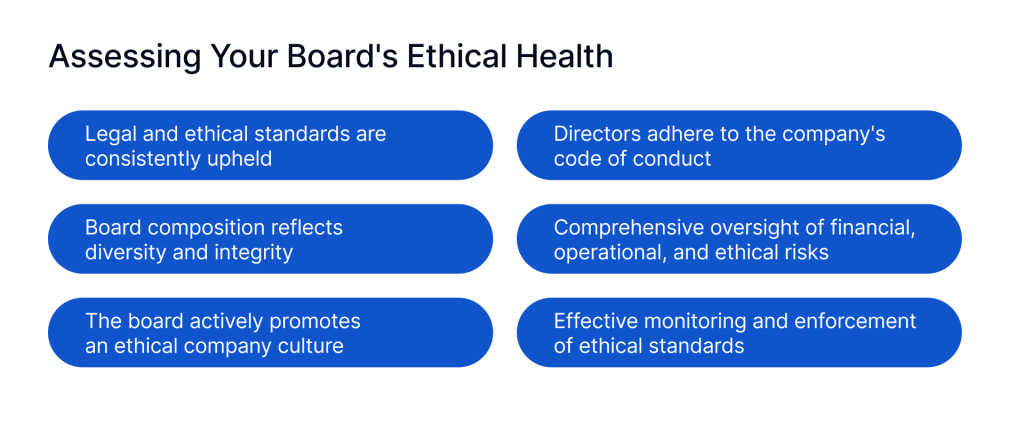
How Do You Recognize Ethical Board Members?
A board is merely the sum of its parts—and in this context, board members are the “parts” that constitute the board. This implies that a truly ethical board can only be achieved with truly ethical board members.
But gauging the ethicality of a person in our multifaceted world is even more challenging than assessing the ethicality of an entire board. Thankfully, there are certain qualities that can indicate an individual’s likelihood of being an ethical board member, such as being:
1. Team-oriented and supportive
An ethical board member should exhibit behavior that uplifts others’ sense of self-worth and importance. They ought to prioritize the success of the team and the company over their own and place the needs of their team and the company ahead of personal aspirations. A good and ethical board member acts selflessly rather than selfishly.
2. Attentive and prudent
An ethical board member gives their full attention to their role without any goals outside of the ones that should be set for their role. They should display attentiveness to the organization’s needs and exercise prudence in board-related matters.
3. Loyal and devoted
An ethical board member’s commitment is unquestionable. They position themselves to serve and support—even if that means taking the limelight or opportunities away from themselves. They put the organization’s needs above their personal interests and avoid conflicts of interest.

4. Compliant and law-abiding
An ethical board member is a stickler for the rules. They know the laws and regulations that affect your company very well and stay up to date with new legal or regulatory developments that could affect your business. They also take internal rules, such as codes of conduct and other policies, seriously, and set an example for others by abiding by them. They follow the organization’s governing laws and policies and ensure that its activities are in alignment with its overall mission.
5. Honest and virtuous
An ethical board member speaks the truth—even if their voice shakes. This phrase, famously associated with Ruth Bader Ginsburg, reflects their commitment to integrity and righteousness that ethical board members should have. Ethical board members should show a genuine commitment to fulfilling their role with honesty and integrity.
As Professor Charlotte Valeur sums it up, “The traits of ethical board members are seen through their actions rather than their words. Being an ethical board member means acting with integrity, honesty, and objectivity. Ethical board members have accountability and put personal agendas aside for the better of the whole.”
6. Courageous and brave
An ethical board member needs to be courageous and brave. They must act ethically even when facing pressure or threats to do otherwise. It takes guts to address challenging issues head-on and hold others accountable.
As Jeannette Lichner describes, ethical board members are “People who don’t just ‘go with the flow’ or ‘get led to decisions’ but really dig in to understand what is going on in the business, what the pressures are; individuals who gather enough evidence to take a position on a difficult decision.”
7. Accountable and transparent
An ethical board member requires the courage not only to hold others accountable but also to hold themselves accountable. They must take responsibility for their actions and decisions and be willing to explain and justify them to stakeholders. They also need to advocate for and practice transparency in the board’s processes and decisions and ensure there is no secrecy surrounding the board’s workings.
8. Fair and just
An ethical board member is fair to themselves and those around them. They have a strong commitment to justice and equity. They dedicate themselves to impartial decision-making, considering what is right and equitable for all stakeholders, not just individual or select groups.
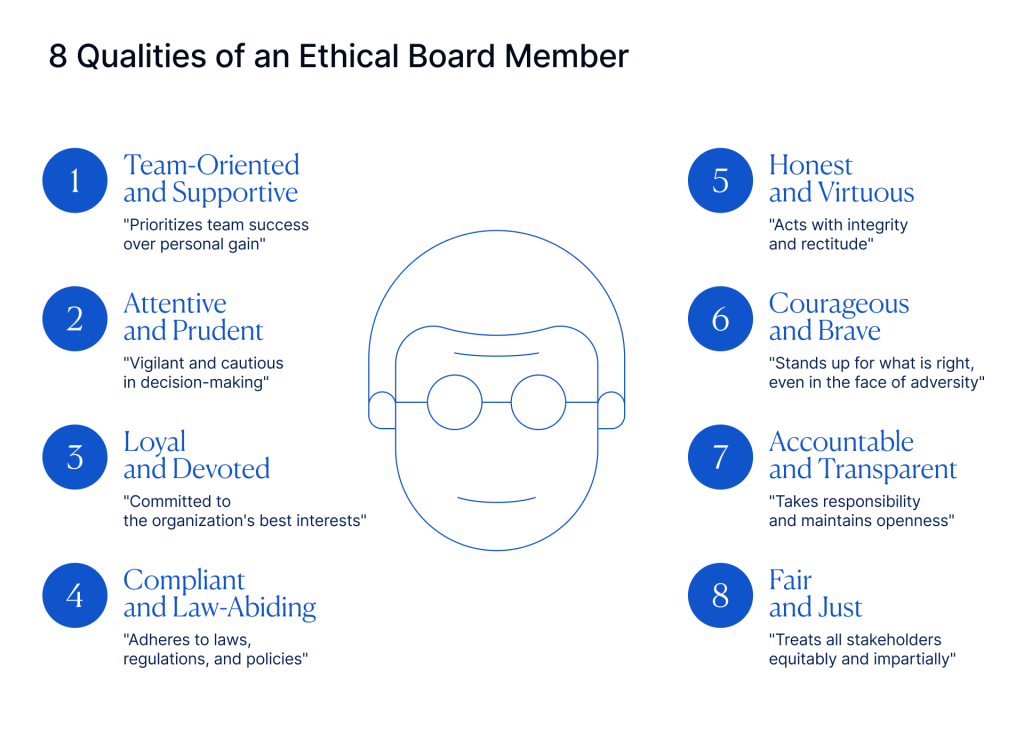
How Do You Create a More Ethical Board
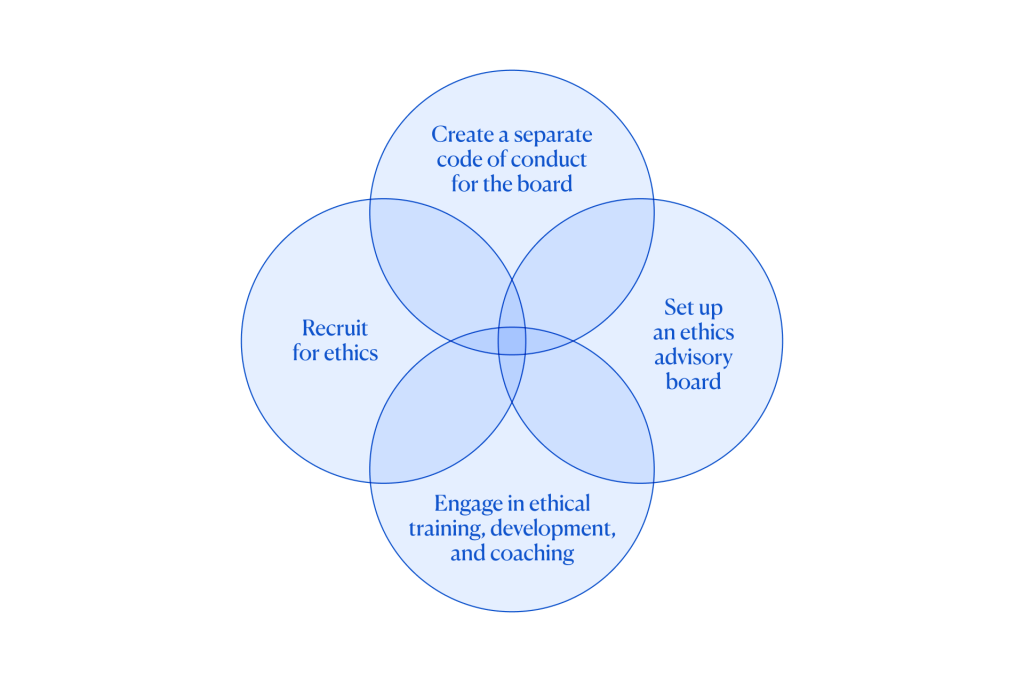
So, upon reviewing the above and thinking about whether your board of directors and board members are ethical, the next logical question is, “What can be done to make my board of directors even more ethical?”
There are a number of steps that businesses can take to ensure they create a culture of ethical behavior on their board of directors, such as:
1. Create a separate code of conduct for the board
Most companies have a standard code of conduct for all their employees, but when it comes to steps to ensure your board’s ethicality, setting up a second, exclusive-to-the-board code of conduct can be a very good idea.
This code should provide clear expectations about the behavior and decision-making processes of board members. It should help prevent conflicts of interest by outlining policies and procedures for dealing with situations where a board member’s personal interests could potentially clash with the organization’s interests.
It should also serve as a guideline for making tough ethical, legal, and financial decisions and ensure that they are made objectively and fairly.
2. Set up an ethics advisory board
Another step you can take to make your board more ethical is to set up an Ethics Advisory Board (EAB). An EAB is tasked with instilling ethical practices throughout an organization. It ensures that ethics are not an afterthought but a central part of daily decision-making processes and corporate culture.
EABs often consist of experts who can provide valuable insights on various types of ethical issues and contribute to more informed and ethically sound decisions. But for an EAB to function effectively, it must have the authority and autonomy to provide recommendations and have its advice taken seriously by the board of directors.
To give power to your EAB, you need to create clear operational guidelines for how the EAB will operate, including the frequency of meetings, processes for reviewing issues, and methods of communication with the board.
3. Engage in ethical training, development, and coaching
Ethics is a skill that can be learned, just like any other skill. When it comes to your board, you can help its members develop and grow into more ethical directors.
Many leadership consulting firms offer leadership development and coaching that can be customized to include elements of ethics education. Such training can remind board members of their roles and responsibilities and help ensure they exercise the “reasonable care, skill, and diligence” that is expected of them.
Confidence in handling ethical issues, reinforced by appropriate training, also encourages the reporting of unethical behavior—thus nurturing a cycle that promotes ethical behavior beyond the training or coaching period.
If you pursue this route, keep in mind that the content of these training, coaching, or development programs should be adapted to the specific needs and challenges of the board and the organization it governs.
The sessions should also be led by individuals or organizations specializing in board training and ethical governance, and follow-up and ongoing support beyond the initial training sessions are necessary to reinforce learning and maintain ethical standards.

4. Recruit for ethics
The simplest way to create an ethical board is to build one from the ground up by recruiting board members known for high ethical standards and using ethical standing as a recruitment requirement for directors.
To achieve this, you must adopt a fair and structured recruitment process that evaluates candidates on their ethical stance and understanding of corporate values in addition to their professional qualifications and experience.
You could also turn to executive search firms like Stanton Chase that specialize in sourcing, assessing, and placing highly ethical (and highly qualified) board members.
Board Services for Ethical Boards
At Stanton Chase, we’ve offered board services and nurtured ethical board members for decades. Through director recruitment, board assessment, and consulting, we’ve guided companies to ensure their leadership upholds both their culture and reputation through ethical conduct and decision-making.
If you’re starting a journey with your board of directors towards always doing what’s right—not just what they have the right to do—we’re ready to join you. Reach out to our consultants here.

About the Commentators
Professor Charlotte Valeur is a renowned corporate governance expert and a passionate advocate for diversity in the boardroom. With an extensive portfolio career, she has served as a Non-Executive Director and Chair for numerous public and private companies, including Laing O’Rourke, BT Pension Fund, and the Institute of Directors U.K. Charlotte is also the Founder and Chair of Board Apprentice, a not-for-profit organization that provides hands-on experience to individuals at the highest levels of business. Her expertise in corporate governance has been sought after by governments and organizations worldwide, and she regularly delivers training and conducts board reviews through her company, Global Governance Group.
Jeannette Lichner is an experienced Non-Executive Director who has served on various private and public sector boards, as well as charitable organizations. She currently serves as Chair of Elucidate GmBh and Square 4. Jeannette’s belief in the importance of people has led her to balance her non-executive roles with teaching, executive mentoring, and coaching. With a deep understanding of functional areas gained from her executive roles in financial services firms, Jeannette provides a holistic, strategic view to the organizations she works with. She is also actively involved in sustainability initiatives as a Senior Associate of the Cambridge Institute of Sustainability Leadership, a Companion Member of the Chartered Management Institute, and a Sustainability Champion.
About the Author
Eleri Dodsworth is a Partner at Stanton Chase London and serves as the Regional Leader for the Diversity, Equity, Inclusion, and Belonging practice group for the EMEA region. She also represents the firm on the AESC Diversity Leadership Council for Europe and Africa.
Eleri is a passionate advocate for equity, inclusion, diversity, and belonging. She strongly believes in helping her clients build diverse leadership teams, seeing diversity and inclusion as essential values that significantly impact business performance. Eleri specializes in placing leaders at the C-suite level, divisional directors, and non-executive directors in listed companies, as well as in private equity, family-owned, and privately owned businesses.
How Can We Help?
At Stanton Chase, we're more than just an executive search and leadership consulting firm. We're your partner in leadership.
Our approach is different. We believe in customized and personal executive search, executive assessment, board services, succession planning, and leadership onboarding support.
We believe in your potential to achieve greatness and we'll do everything we can to help you get there.
View All Services
